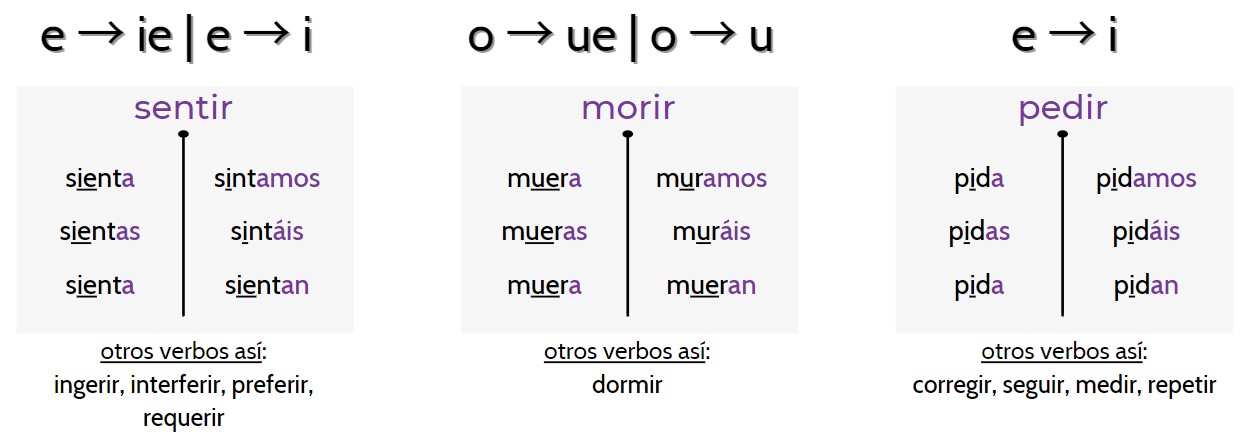Present Subjunctive Conjugation: Learn or review and practice!
Present Subjunctive Conjugation: Regular Verbs
Regular verbs follow these patterns in the present subjunctive:
| amar |
comer |
vivir |
|||
| ame yo |
amemos nosotros |
coma yo |
comemos nosotros |
viva yo |
vivamos nosotros |
| ames tú / vos |
améis vosotros |
comas tú / vos |
comáis vosotros |
vivas tú / vos |
viváis vosotros |
| ame usted él, ella |
amen ustedes ellos, ellas |
coma usted él, ella |
coman usted él, ella |
viva usted él, ella |
vivan usted él, ella |
PRÁCTICA DE CONJUGACIÓN:
Present Subjunctive Conjugation: Verbs With Spelling Changes
Some verbs have spelling changes to correctly reflect the pronunciation.
- Verbs that end in -ger & -gir have a g → j spelling change.
- Verbs ending in -guir have a gu → g spelling change.
- Verbs ending in -ncer (vencer & convencer) have a c → z spelling change.
- Verbs ending in -car have a c → que spelling change.
- Verbs ending in -gar have a g → gu spelling change.
- Verbs ending in -zar have a z → c spelling change.
PRÁCTICA DE CONJUGACIÓN EN CONTEXTO
Present Subjunctive Conjugation: Irregular Verbs
-AR and -ER verbs that have an E → IE and O →UE stem change in the present indicative, maintain those same stem changes in the present subjunctive.
- E → IE stem changes: Verbs like QUERER

Other verbs like QUERER: cerrar, comenzar, empezar, entender, pensar, perder
- U → UE stem changes: Verbs like ALMORZAR

- Present indicative -IR verbs that have E → IE and O → UE stem changes, maintain these changes in the present subjunctive. Addtionaly, some of these verbs have an E → I and O → U stem change in the nosotros and vosotros forms. Study the stem changes in the following image.

PRÁCTICA DE CONJUGACIÓN: STEM-CHANGING VERBS IN PRESENT SUBJUNCTIVE
Present Subjunctive Conjugation: Other Irregularities
- Verbs ending in -UIR, with the exception of seguir, get a Y added after the U in all forms of the present subjunctive.
- INCLUIR: incluya, incluyas, incluya, incluyamos, incluyáis, incluyan
- HUIR: huya, huyas, huya, huyamos, huyáis, huyan
- -IAR and -UAR verbs have a written accent on the í and the ú in every form except for nosotros and vosotros.
- ENVIAR: envíe, envíes, envíe, enviemos, enviéis, envíen
- CONTINUAR: continúe, continúes, continúe, continuemos, continuéis, continúen
- Other verbs that have an irregularity in only the YO form of the present indicative, have a similar irregularity in all forms of the present subjunctive.
infinitive
indicative
caber
caer
conocer
hacer
poner
salir
tener
traer
valer
ver
quepo
caigo
conozco
hago
pongo
salgo
tenga
traigo
valgo
veo
Other verbs like conocer: agradecer, amanecer, aparecer, complacer, conducir, crecer, establecer, lucir, merecer, ofrecer padecer, parecer, permanecer, perecer, producir, reconocer, traducir
Present Subjunctive Conjugation: Six Common Irregular Verbs
Finally, we have six common irregular verbs that don’t follow the other patterns in the present subjunctive: dar, estar, haber, ir, saber, and ser.
PRÁCTICA DE CONJUGACIÓN EN CONTEXTO

